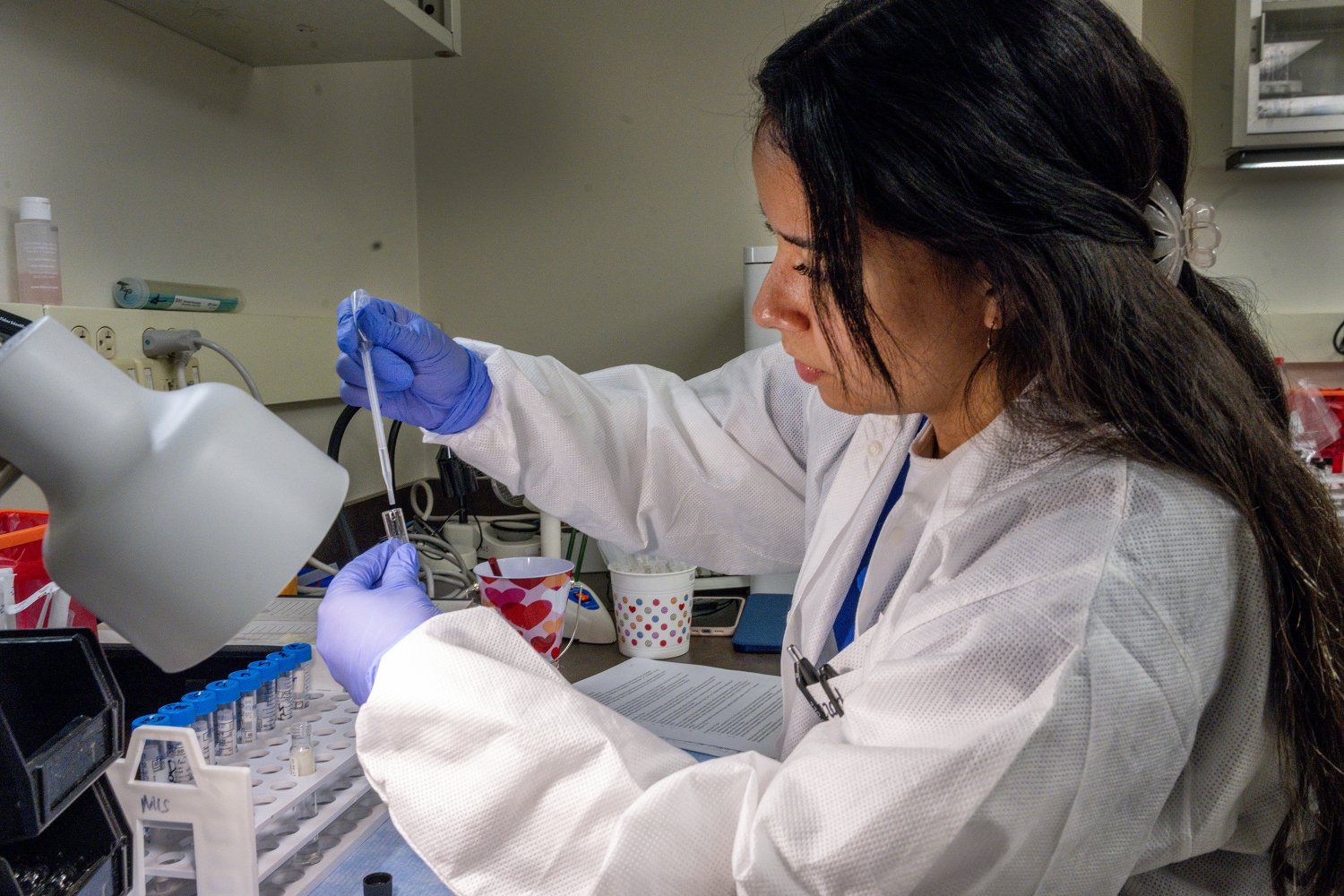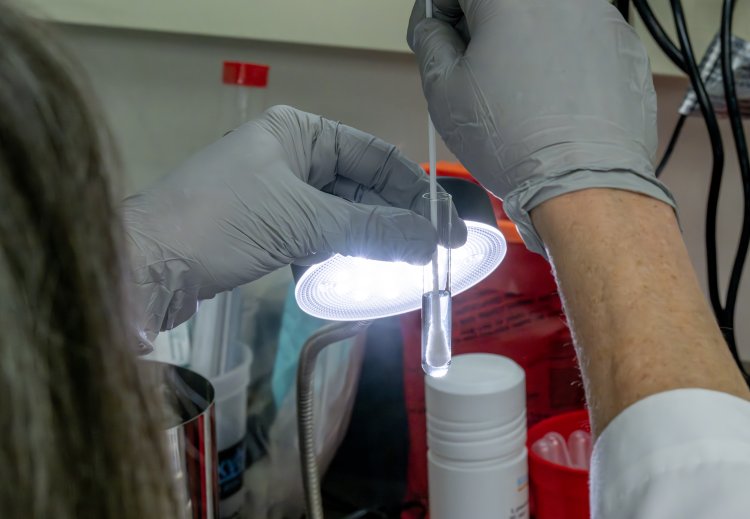Program Overview
- Bachelor's Degree
- MLT to BHS Completion Degree
Join one of the country’s fastest growing fields.
Medical laboratory scientists play a vital role in the detection, diagnosis and treatment of disease. The Bureau of Labor Statistics states that employment opportunities for medical laboratory scientists are expected to exceed most occupations through the next decade.
Medical laboratory science professionals, often called medical laboratorians, are vital health care detectives, uncovering and providing information from laboratory analyses that assist physicians in patient diagnosis and treatment, as well as in disease monitoring or prevention. In addition to performing and evaluating laboratory procedures, the medical laboratory scientist may also be involved in developing new diagnostic procedures, supervising and conducting biomedical research, providing technical expertise, consulting, teaching, and/or analyzing and implementing laboratory information systems.
MLT to BHS COMPLETION DEGREE
For the Practicing Technician
The MLT to BHS program is designed for licensed medical laboratory technicians who wish to pursue a Bachelor of Health Sciences in Medical Laboratory Science and want to advance their education. Graduates of the medical laboratory science program will qualify for employment in a variety of settings such as education, supervision, or management positions, and technical consultants.
TRADITIONAL PROGRAM
Earn Bachelor's Degree in Medical Laboratory Science
Students are encouraged to follow a specific curriculum plan to ensure progressive learning throughout the degree. Specific courses are required to be completed in sequential order to enhance the student’s learning and success within the program.
A complete listing of course requirements for the MLS program can be reviewed by selecting the following link.
APPLYING TO THE PROGRAM
To be considered for selection to the Medical Laboratory Science program, applicants must meet the following minimum requirements:
- Complete 22 credit hours of preprogram coursework with a “C” or better, as specified by the MLS program (courses marked with an “asterisk” in the degree requirements must be completed in the required 22 credit hours and prior to taking courses in the professional program.)
- Students will be required to complete all preprogram courses, specified by the MLS program, prior to enrollment into professional MLS courses.
- Achieve a minimum cumulative college GPA of 2.7 on a 4.0 scale.
- Submit completed application form to the MLS program. The forms are required to be submitted prior to the applicable application date (October 1 or March 1).
Class size is limited and the selection process is competitive. Academic performance and a general understanding of the MLS profession are strongly considered during the selection process.
All completed applications and supportive documentation must be received or postmarked by the published deadlines to be considered for selection to begin the MLS professional course work in the Fall Trimester of the following year. The deadline for early selection of a limited number of class seats is October 1. The deadline for final selection to the program is March 1.
Selection process:
A selection committee for the MLS program will evaluate all completed applications in October and March each year. Applicants with a strong academic background and currently enrolled in Baptist University, or completing pre-program courses at institutions with collaborative or articulation agreements, will be given priority for interviews. Applicants meeting minimum selection criteria are not guaranteed an interview.
Selection to the MLS program is based on the following:
- Academic potential for success from the academic record.
- Academic strength in previous college coursework, with specific attention given to performance in the pre-program courses.
- Personal strengths and knowledge of Medical Laboratory Science program.
- Past failures affecting cumulative college GPA and pre-program courses may impact selection into the program. Each file will be considered individually.
A personal interview will be required of each applicant. Applicants will be notified in writing of selection to the MLS program.
Guaranteed Job Offer

- ONE OF THE COUNTRY’S FASTEST GROWING FIELDS
- FAITH-BASED ATMOSPHERE
- SMALL CLASS SIZES
- STUDENT CENTERED WITH SMALL CLASSROOMS
- HANDS-ON INSTRUCTION
- IN-CLASS INSTRUCTION, LABORATORY EXPERIENCE & CLINICAL PRACTICUM EXPERIENCE
$54,184 Median Salary
U.S. Bureau of Labor Statistics for Clinical Laboratory Technologists

Career Opportunities
- Medical Laboratory ScientistsIn hospital labs and clinics, forensic labs, veterinary clinics, industrial research labs, and molecular biotechnology labs
Mission
The medical laboratory science (MLS) program mission is to provide:
- Exemplary laboratory education.
- Instruction necessary to educate individuals to become skilled, caring health care practitioners who value lifelong learning.
- Scholarly activity through practice-based research.
- Positive impact on the health status of the community through service.
In accordance with the mission of the Baptist University, educational experiences in the MLS program reflect the importance of a strong general educational foundation and include opportunities for critical thinking, use of technology, effective communication, skills, and the ability to work effectively with others.
Program Goals
- Maintain a nationally accredited program in medical laboratory science.
- Implement and promote the rules and regulations of the State of Tennessee Medical Laboratory Board for training programs for medical laboratory personnel.
- Design and implement a curriculum whereby upon completion of the program the students demonstrate the entry-level competencies to gain employment in the MLS or related laboratory field.
- Provide a program to prepare well-trained laboratory professionals who will be eligible to sit for the national certification examinations.
- Display a commitment to the role and the development of the medical laboratory professional.
- Develop in the students the necessary interpersonal and communication skills to professionally interact with patients, patients’ families, physicians, and other members of the health care team
Program Learning Outcomes
Upon completion of their course of study, graduates of the medical laboratory science program will:
- Perform the full range of clinical laboratory tests in the diagnostic areas appropriate for entry level practice.
- Demonstrate appropriate communication skills, education techniques and a commitment to professionalism.
- Evaluate validity of laboratory test results and take appropriate corrective action.
- Demonstrate an understanding of safety regulations and standard precautions.
Program Accreditation
NAACLS (National Accrediting Agency for Clinical Laboratory Sciences)
The MLS program at Baptist Health Sciences University is accredited by NAACLS.
NAACLS contact information
5600 North River Road, Suite 720
Rosemont, IL 60018
773-714-8880
Tennessee State Licensure Requirement
All medical laboratory personnel and special analysts in Tennessee must hold current Tennessee licensure, unless specifically exempt by statute or rules promulgated by the Tennessee Medical Laboratory Board.
The MLS program at Baptist Health Sciences University has been granted a certificate by the Tennessee Department of Health to conduct and maintain a school for training medical laboratory personnel in the specialty of medical laboratory technologist, general.
Medical Laboratory Board
Metro Center Complex
665 Mainstream Drive
Nashville, TN 37423
Additional requirements for licensure may be required by the state in which you practice.
ADVISORY BOARD
CLINICAL SITES
CLINICAL HANDBOOK
TECHNICAL STANDARDS
Technical Standards for Matriculation, Retention, and Graduation for Medical Laboratory Science
The Bachelor of Health Sciences (BHS) degree with a major in Medical Laboratory Science (MLS) from the Baptist Health Science University College of Health Professions indicates the holder is a medical laboratory scientist professional who meets the MLS career entry level competencies. Therefore, all applicants and matriculated students must possess certain essential abilities and characteristics required for completion of the BHS-MLS degree that consist of certain minimum physical and cognitive abilities and emotional characteristics. This is to ensure that candidates for admission, matriculation, and graduation are able to complete the entire course of study and participate fully in all aspects of clinical practicum training, with or without reasonable accommodations.
The candidate must demonstrate competency in the requisite areas. Students are required to demonstrate said competencies to perform entry level diagnostic tests in the clinical laboratory in a variety of health care facilities.
Baptist University is committed to the admission and matriculation of qualified students and does not discriminate based on race, color, ethnicity, sex, gender, marital status, national or ethnic origin, age, disability, creed, or religion. Candidates with disabilities can request reasonable accommodations if needed to meet these technical standards/essential functions by following the University’s policies and procedures and contacting Access Services. A candidate must be able to perform these outlined technical standards/essential functions in an independent manner.
The national board examinations for medical laboratory science may have more stringent technical standards than outlined in this document.
Students who accept an offer of admission from Baptist University will be required to sign an affirmation regarding compliance with the technical standards. Should a student's ability to meet the technical standards/essential functions change at any point in the academic program, it is their responsibility to report this to the Program Chair and Access Services.
Cognitive
Ability to add, subtract, multiply and divide whole numbers and fractions, calculate time, use metric system for measurements, calculate percentages, solve for one variable, set-up and solve ratio and proportion problems, interpret simple statistical data. Ability to comprehend manuals, journals, instructions in use and maintenance of equipment, safety rules and procedures and drawings. Ability to synthesize, coordinate, and analyze data standards. Ability to deal with abstract and concrete variables, define problems, collect data, establish facts, and draw valid conclusions. Ability to interpret instructions furnished in oral, written, diagrammatic, or schedule form.
Communication
Ability to verbally communicate understandably in English and to understand English when spoken in person or via the telephone. Ability to compose English sentences; write reports using prescribed format and conforming to rules of punctuation, spelling, grammar, diction and style. Ability to follow oral and written instruction to correctly perform laboratory procedures. Ability to listen accurately and have a fine discrimination in sounds.
Environmental
Ability to work indoors, be around moving machinery; factors: fumes, gases, odors, irritating particles, possible exposure to toxic or caustic chemicals, blood and body fluids, noise, radiation or electrical energy, vibration; work in confined spaces, use a computer monitor; work alone, with others, or around others. Lift and move objects weighing up to 20-50 pounds.
Mobility
Ability to maneuver in the laboratory, around instruments, in confined spaces, and in patient rooms. Movement includes utilizing shoulders, arms, and neck; bending; twisting the body; standing; reaching and grasping overhead, in front of the body, and down. Ability to manipulate small objects with fingertips or control adaptive devices. Eye/hand and eye/hand/foot coordination.
Perception
Ability to perceive pertinent detail in objects or in pictorial or graphic material; to make visual comparisons and discriminations and see slight differences in shapes and shadings of figures, and widths and lengths of line; to comprehend forms in space and understand relationships of plane and solid objects; the ability to visualize objects of two or three dimensions.
Personal Traits
Ability to comprehend and follow instruction; perform simple and repetitive tasks; maintain a work pace appropriate to a given work load; relate to other people; perform complex or varied tasks; make generalizations, evaluations or decisions without immediate supervision; accept and carry out responsibility for directions, control and planning. Perform all duties with honesty, integrity, and confidentiality.
Vision
Natural or corrected to 20/20, ability to distinguish red, yellow, and blue colors, distinguish clear from cloudy, and distinguish objects in the range of 1 micron through the microscope.
Reasonable Accommodations for Students with Disabilities
In accordance with the Americans with Disabilities Act (ADA), Section 504 of the Rehabilitation Act, and other applicable laws, Baptist Health Sciences University provides reasonable accommodations for otherwise qualified students with verified disabilities. An accommodation will not be provided if it would result in the fundamental alteration of the university’s programs, services or activities, or if it would impose undue financial or administrative burdens on the University. The office that assists students with disabilities at Baptist Health Sciences University is Access Services.
Additional information about Baptist Health Sciences University’s services for students with disabilities may be found at https://www.baptistu.edu. If student circumstances should change related to these technical standards/essential functions, the student will promptly notify the Medical Laboratory Science Program Chair and/or Access Services if reasonable accommodations are required at any point.





